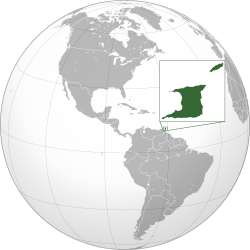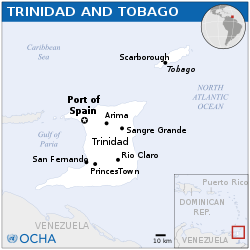Republic of Trinidad and Tobago | |
|---|---|
| Motto: "Together we aspire, together we achieve" | |
| Anthem: "Forged from the Love of Liberty" | |
 | |
 | |
| Capital | Port of Spain 10°40′0″N 61°30′27″W / 10.66667°N 61.50750°W |
| Largest city | Chaguanas 10°31′N 61°24′W / 10.517°N 61.400°W |
| Official languages | English[1] |
| Other languages | See Languages in Trinidad and Tobago[2] |
| Ethnic groups (2011)[3] | |
| Religion (2020)[4] |
|
| Demonym(s) |
|
| Government | Unitary parliamentary republic |
| Christine Kangaloo | |
| Keith Rowley | |
| Bridgid Annisette-George | |
| Nigel de Freitas | |
| Ivor Archie | |
| Kamla Persad-Bissessar | |
| Legislature | Parliament |
| Senate | |
| House of Representatives | |
| Independence from the United Kingdom | |
• Province of the West Indies Federation | 3 January 1958 – 14 January 1962 |
| 31 August 1962 | |
• Joined the Caribbean Community at the Treaty of Chaguaramas | 1 August 1973 |
• Republic | 1 August 1976[b] |
| Area | |
• Total | 5,131 km2 (1,981 sq mi) (164th) |
• Water (%) | negligible |
| Population | |
• 2024 estimate | 1,508,635 [7] (154th) |
• Density | 294/km2 (761.5/sq mi) (34th) |
| GDP (PPP) | 2023 estimate |
• Total | |
• Per capita | |
| GDP (nominal) | 2023 estimate |
• Total | |
• Per capita | |
| Gini (2012) | 39.0[9] medium inequality |
| HDI (2022) | very high (60th) |
| Currency | Trinidad and Tobago dollar (TTD) |
| Time zone | UTC-4 (AST) |
| Date format | dd/mm/yyyy |
| Drives on | left |
| Calling code | +1 (868) |
| Internet TLD | .tt |
Trinidad and Tobago,[a] officially the Republic of Trinidad and Tobago, is the southernmost island country in the Caribbean. Consisting of the main islands Trinidad and Tobago and numerous much smaller islands, it is situated 11 kilometres (6 nautical miles) off the coast of northeastern Venezuela and 130 kilometres (70 nautical miles) south of Grenada.[11] It shares maritime boundaries with Barbados to the east, Grenada to the northwest and Venezuela to the south and west.[12][13] Trinidad and Tobago is generally considered to be part of the West Indies. The island country's capital is Port of Spain, while its largest and most populous municipality is Chaguanas.
The island of Trinidad was inhabited for centuries by Indigenous peoples before becoming a colony in the Spanish Empire, following the arrival of Christopher Columbus, in 1498. Spanish governor José María Chacón surrendered the island to a British fleet under the command of Sir Ralph Abercromby in 1797.[14] Trinidad and Tobago were ceded to Britain in 1802 under the Treaty of Amiens as separate states and unified in 1889.[15] Trinidad and Tobago obtained independence in 1962, and became a republic in 1976.[16][11]
Unlike most Caribbean nations and territories, which rely heavily on tourism, the economy is primarily industrial with an emphasis on petroleum and petrochemicals;[17] much of the nation's wealth is derived from its large reserves of oil and natural gas.[18]
Trinidad and Tobago is well known for its African and Indian cultures, reflected in its large and famous Carnival, Diwali, and Hosay celebrations, as well as being the birthplace of the steelpan, the limbo, and music styles such as calypso, soca, rapso, parang, chutney, and chutney soca music. The country gets fewer hurricanes than most of the Caribbean because it is farther south.
- ^ Government of the Republic of Trinidad and Tobago. "Home". Ttconnect.gov.tt. Archived from the original on 15 June 2018. Retrieved 16 March 2019.
- ^ "Trinidad and Tobago – Languages". Ethnologue. Archived from the original on 22 April 2021. Retrieved 20 May 2018.
- ^ Cite error: The named reference
2011Censuswas invoked but never defined (see the help page). - ^ "National Profiles; World Religion". www.thearda.com. Archived from the original on 25 January 2024. Retrieved 25 January 2024.
- ^ "Trinbagonian". Macmillan Dictionary. Archived from the original on 20 June 2018. Retrieved 20 June 2018.
- ^ "Republic Day". Archived from the original on 15 October 2022. Retrieved 17 September 2022.
- ^ "Trinidad and Tobago Population (2024) - Worldometer". Retrieved 1 October 2024.
- ^ a b c d "World Economic Outlook Database, October 2023 Edition. (TT)". IMF.org. International Monetary Fund. 10 October 2023. Archived from the original on 31 October 2023. Retrieved 15 October 2023.
- ^ Bridglal, Carla (12 March 2013). "Allowing govt to manage better". Trinidad Express. Archived from the original on 14 March 2013. Retrieved 23 December 2013.
- ^ "Human Development Report 2023/24" (PDF). United Nations Development Programme. 13 March 2024. Archived (PDF) from the original on 13 March 2024. Retrieved 13 March 2024.
- ^ a b Cite error: The named reference
EBTTwas invoked but never defined (see the help page). - ^ "Treaty between the Republic of Trinidad and Tobago and the Republic of Venezuela on the delimitation of marine and submarine areas, 18 April 1990" (PDF). The United Nations. Archived (PDF) from the original on 4 September 2008. Retrieved 13 April 2009.
- ^ "The 1990 Accord Replaces the 1942 Paris Treaty". Trinidad and Tobago News. Archived from the original on 19 September 2009. Retrieved 13 April 2009.
- ^ Carmichael (1961), pp. 40–42.
- ^ Carmichael (1961), p. 52.
- ^ "Trinidad and Tobago". CIA World Factbook. Archived from the original on 9 January 2021. Retrieved 16 August 2019.
- ^ "Trinidad and Tobago Country brief". The World Bank. Archived from the original on 12 January 2007.
- ^ "Trinidad and Tobago profile – Overview". BBC News. 24 October 2012. Archived from the original on 13 September 2014. Retrieved 13 September 2014.
Cite error: There are <ref group=lower-alpha> tags or {{efn}} templates on this page, but the references will not show without a {{reflist|group=lower-alpha}} template or {{notelist}} template (see the help page).

